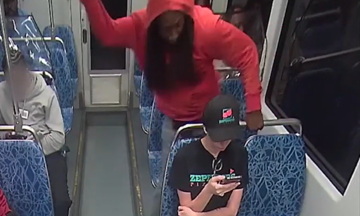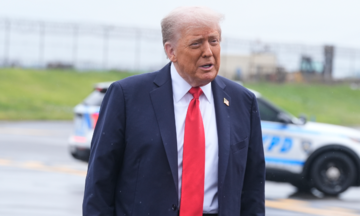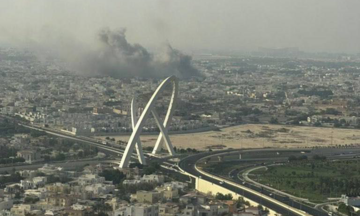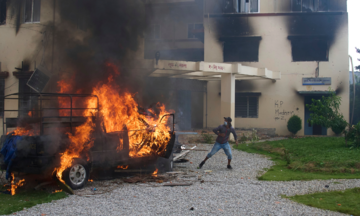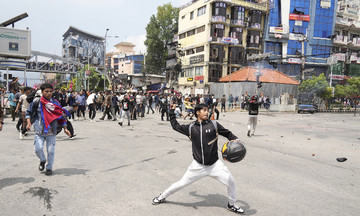On 4/9, US Immigration and Customs Enforcement (ICE) and law enforcement conducted an unprecedented raid at a Hyundai and LG battery plant under construction in Ellabell, Georgia.
Agents arrested 457 people accused of working illegally, including over 300 South Korean citizens. Video released by authorities showed workers handcuffed and shackled, being loaded onto prison transport vehicles.
 |
Immigrant workers arrested during an ICE raid at a Hyundai and LG battery plant in Georgia on 4/9. Photo: ICE |
Immigrant workers arrested during an ICE raid at a Hyundai and LG battery plant in Georgia on 4/9. Photo: ICE
ICE stated that during the arrests, they discovered these individuals "had fraudulently used visitor visas" to work in the US. Observers say the raid opens a new front in the White House's broad crackdown on illegal immigration, but with potentially unwanted consequences for the US.
Multinational companies with foreign employees in the US have become concerned and are seeking legal advice. "Clients are constantly messaging us asking if they are at risk of a similar situation," said Matthew Dunn, head of the US business immigration practice at law firm HSF Kramer. "They're asking if their US managers are at risk and if their foreign staff here on company-sponsored work visas are being targeted by the government."
Other immigration lawyers believe many of the South Koreans arrested by ICE entered the US on B-1 visas, used for short-term business trips, or through a related visa waiver program. Many of those arrested were working for subcontractors.
However, the regulations surrounding these entry provisions are somewhat vague. "This could be abuse of the B-1 visa or it could be ICE overreach. They could be applying a more restrictive interpretation of the rules regarding what business visitors are allowed to do in the US," said Dan Maranci, a partner at WR Immigration.
Charles Kuck, founding partner of Atlanta-based immigration law firm Kuck Baxter, said he is representing several of those arrested in Ellabell. Kuck said many South Korean workers came to the US under visa provisions allowing providers to support the installation of equipment for a US business.
"Two corporate clients called me on 6/9. As foreign investors with large US operations, they asked how to prepare for ICE agents showing up at their plants," Kuck said.
Tami Overby, an international trade consultant at DGA Group and former president of the US-Korea Business Council, said some large foreign companies have stopped sending employees on business trips to the US to review the legal ramifications of the Georgia arrests.
"The images of hundreds of South Korean workers being treated like criminals are really shocking," she said. "Those videos and images were shown not only in South Korea, but also in Japan, Taiwan, and other trading partners with large investments in the US."
In a 7/9 interview with CNN, Tom Homan, an immigration policy advisor to President Donald Trump, declared that the administration would conduct more such workplace raids in the future. He added that knowingly hiring illegal immigrant workers was driving down wages for Americans.
According to Overby from DGA Group, industries most at risk of work visa crackdowns are those needing to bring in local talent to the US. This demand is particularly high in fields where Americans lack technical expertise compared to Asian workers, such as battery manufacturing, shipbuilding, and semiconductors.
South Korean workers are chained and escorted onto a vehicle after US officials raided a Hyundai and LG battery plant in Georgia on 4/9. Video: ICE
Taiwan Semiconductor Manufacturing Company (TSMC), the world's largest chip maker, says it will spend $165 billion to build six fabrication plants, two advanced packaging facilities, and a research and development center in Arizona.
Those familiar with TSMC's operations consider the raid on the Hyundai and LG plant a "special case" and believe they are not at risk of a similar crackdown. However, Taiwanese executives say the raid has certainly unnerved the foreign business community. "Perhaps Trump did it for some political reason, to send a message to the South Korean government. The US government is now truly different and unpredictable," one said.
In South Korea, the images of Hyundai and LG workers in handcuffs and shackles have shocked citizens, who feel "betrayed." The tension threatens to undermine a close military and economic alliance. For South Korean Prime Minister Lee Jae-myung, who took office in June, this is an unexpected obstacle as he seeks to leverage an improving relationship with President Trump to secure defense commitments from the US.
"Those images will do lasting damage to America's reputation," said John Delury, a senior fellow at the Asia Society, a New York-based research organization. He believes governments will now question whether they can trust the US as a steadfast ally in all situations.
As part of a tariff agreement reached in July, South Korea pledged to invest $350 billion in the US. However, the Georgia raid is creating a barrier, causing South Korean businesses to reconsider participating in the plan.
"This exposes the limits of what the South Korean government can do," commented Kim Tae-Hyung, a professor of political science at Soongsil University. "Trump's unpredictability and tendency to act on his own can be frustrating, but it's a reality that cannot be ignored."
Robert Loughran, an immigration lawyer at Foster Global in Texas, said the raid will "create an atmosphere of unease" at factories and businesses employing foreign workers. However, he believes this was inevitable after a long period of lax US management of immigrant labor.
"There were times when ICE agents were instructed to just sit around unless there was a specific complaint. ICE units are now encouraged to go out and look for people who violate immigration laws. Frankly, they have a lot of targets," he said.
Vu Hoang (According to FT, AFP, Reuters)



